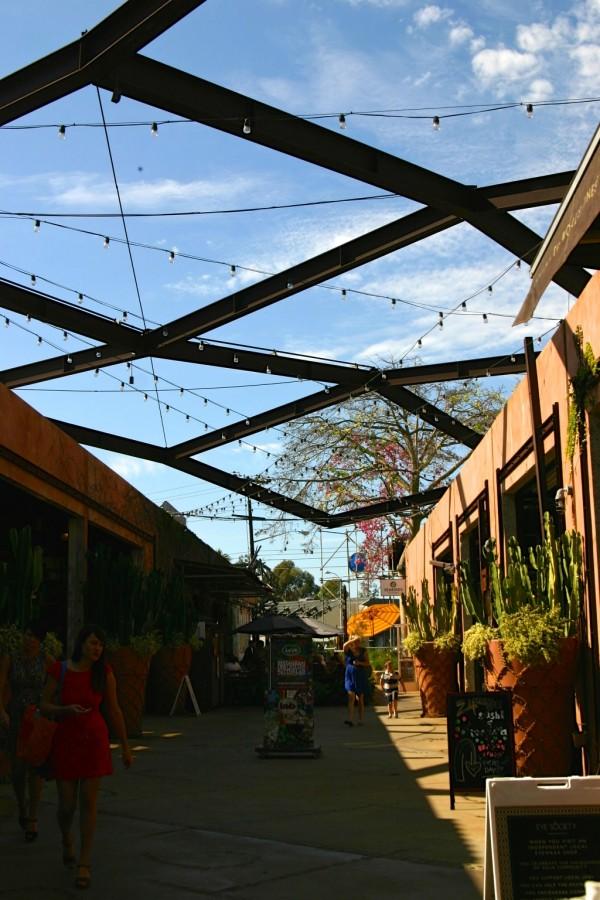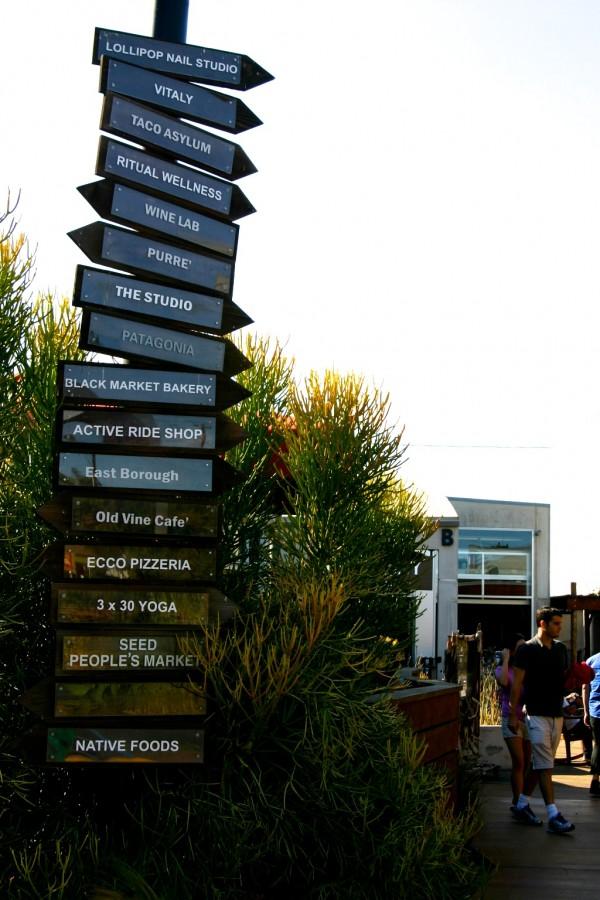Hidden treasures of Costa Mesa
Spent a day in a humble community of fashion, food and fun.
Nov 10, 2014
Along Bristol Street lies The LAB and The CAMP. No, these are not laboratories for scientists or campgrounds for spending the night, but rather artistic collections of unique shops and restaurants for people who want to be inspired.
In 1993, a night vision goggle factory in Costa Mesa began its transformation into what is now known as the “Little American Business”, or The LAB — an anti-mall that aims to “combat retail monotony”.
“To me the anti-mall stands for everything the mall isn’t,” said senior Sydney Mahl. “[The LAB] doesn’t seem so focused on making money as much as providing an experience for the consumer; whereas in a mall, everywhere you walk you’re inundated by stores and advertisements and everything. I think that’s what kind of contributes to the uniqueness of The LAB, that it’s anti-consumerism and yet it’s still like a shopping place.”
With diverse shops like Urban Outfitters and Buffalo Exchange, The LAB appeals to trendsetters who aren’t afraid to try on something crazy and deviate from what’s “in”. The delicious foods from Gypsy Den Cafe, Habana, Zipangu and more attract the appetites of customers of all ages and cultures. But The LAB is so much more than just shops and restaurants.
“I go to The LAB because I like the layout of the whole design,” Mahl said. “I’m a big outdoor person so I like that it’s more natural. It’s like one of those places that relaxes me when I go there so it’s kind of nice to just hang out at the coffee shop and have a relaxing weekend rather than focusing on everything I have to do.”
The tunnel made of leafy vines, the tree trunks wrapped with colorful knitting, the wall murals bursting with creativity, all contribute to the humble feel of The LAB.
“Everything’s non-artificial,” said Adrianna Moncaba, shopkeeper of Shop Tibet. “Things you would find across the street at South Coast Plaza, there are things in there that are, I would say, not exactly too real. Stuff that you get here, are stuff that are made from where we live, from the Earth. And a lot of stuff here is hand-stitched, so a lot of people make their own stuff and it’s something that not a lot of people have.”
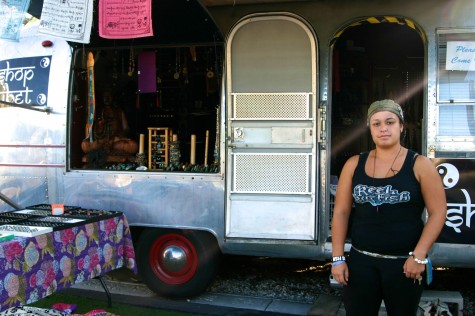
Goods from Asia – Adrianna Moncaba, shopkeeper of Shop Tibet, stands by her trailer.
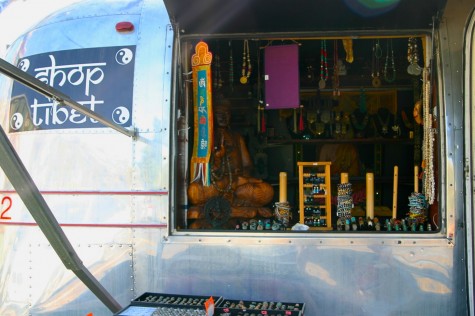
A peep inside – The trailer is filled with a variety of necklaces, bracelets, earrings and more.
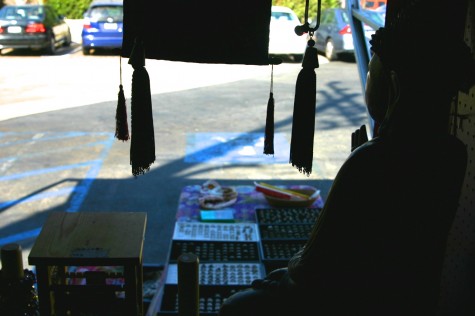
From within – The trailer creates the perfect mood with its dim lighting and smell of incense.
Moncaba began working at The LAB a little over a year ago. Her Shop Tibet trailer was originally used as a bike shop but was then turned into a shop for cultural goods shipped directly from Tibet and Nepal.
“I love working here,” Moncaba said. “People are great. People are very nice. There’s absolutely like no bad energy here.”
Stacey Peterson could say the same for The CAMP, where she runs her own trailer shop The Studio.
“The CAMP is special because it’s kind of like going out on a tiny vacation,” Peterson said. “It’s kind of getting away from the basic mall or strip mall and it’s definitely got its own look and its own vibe.”
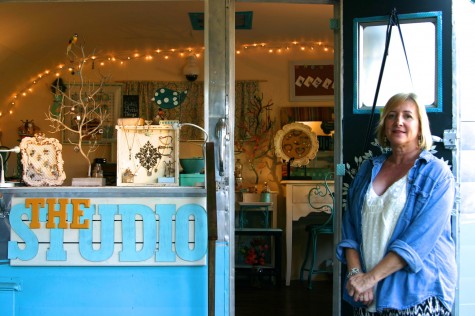
Stacey’s studio – Stacey Peterson, owner of The Studio, stands by her trailer filled with self-made jewelry.
Right across the street from The LAB, The CAMP is a “green gathering spot“.
“We just liked the word ‘camp’ since it denotes the great outdoors, something organic and evokes memories of our midwestern childhood,” said Linda Sadeghi, creator and owner of The LAB and The CAMP. “We tried to include as many eco-friendly elements when we built The CAMP, such as certified redwood, grass roof, percolation system in the parking lot as well as drought tolerant and indigenous landscaping. We also transplanted the two tall trees near Native Foods from a construction site elsewhere in Costa Mesa where they were going to be bulldozed.”
All of the shops and restaurants are also focused on promoting a health-conscious and eco-friendly lifestyle. The handcrafted and recycled items of SEED People’s Market, the drool-worthy teas and coffees of Milk+Honey, and the vegetation immersed everywhere in the architecture create the atmosphere of a small quaint town.
“The CAMP is a community,” Peterson said. “You have really young people, and then you’ve got the people who have a lot of money and are coming to eat at some of the more expensive restaurants. I’ve seen homeless people here, I’ve seen just pretty much everything.”
The CAMP also has various artistic features that add on to the homey feel, such as a sign post with arrows pointing towards different destinations, stairs with “green” sayings on every step, and multicolored mailboxes for each business.
Stacey, herself, takes part in developing the artistic strand of The CAMP. Her trailer shop, The Studio, is a jewelry shop with products handmade by herself down to the individual silver pieces and glass beads.
“I’ve been making jewelry since I was 10 and I’ve been traveling around, selling at art galleries, doing different bead shows and things like that for years,” Peterson said. “Then I decided that I wanted one little spot so came down here one night and this was for lease.”
Since her settlement at The CAMP, Stacey has been able to transform her trailer into a personality, with its baby blue details and string light borders. Just as Shop Tibet is home for Moncaba, The Studio is home for Peterson.
Who knew the unheard-of Bristol Street of Costa Mesa would have such genuine treasures?

